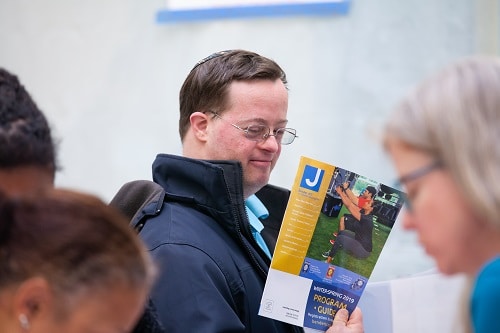-
07 February 2020
A reflection from Lisa Handelman, Federation’s Disability Inclusion Specialist.
“You are not obligated to complete the work, but neither are you free to desist from it.” (Pirkei Avot 2:21).
 This quote is often used in the context of social action work, those endeavors that are too big for any one person to handle alone, yet nevertheless require individual action for progress to be made. What I like about this quote is that it asks each of us to reflect. Have we done our part? As individuals, as organizations, as a community, have we done enough to benefit the world, or have we abstained and held back when action was needed?
This quote is often used in the context of social action work, those endeavors that are too big for any one person to handle alone, yet nevertheless require individual action for progress to be made. What I like about this quote is that it asks each of us to reflect. Have we done our part? As individuals, as organizations, as a community, have we done enough to benefit the world, or have we abstained and held back when action was needed?
February is Jewish Disability Awareness, Acceptance, and Inclusion Month (JDAIM). It is an annual time for us to reflect on the state of inclusion in Greater Washington. Recently, I met with representatives of local Jewish agencies, including CEOs from The Jewish Federation of Greater Washington’s partners such as JSSA, the Bender JCC of Greater Washington, and Sunflower Bakery and Café as well as more recent partners like GatherDC, the Capital Jewish Museum, and Sixth & I. I presented to the group along with Dr. Arielle Silverman, the founder of Disability Wisdom Consulting and a social psychologist and self-advocate who has spent nearly 15 years doing research in the field of disability. We discussed the stages of inclusion, and the progression of how institutions and communities perceive and prioritize making sure people with all abilities are included.
- Stage 1: Antipathy and active exclusion
- Stage 2: Tolerance or passive exclusion
- Stage 3: Helping and inspiration
- Stage 4: Individual equality
- Stage 5: Inclusion as social justice
At the gathering, each organization shared where they were on the journey to become more inclusive. We talked a lot about passive exclusion, how we may believe in the idea of inclusion but resist taking action to ensure that we are indeed inclusive. Because many of us serve as employers and event planners, we need to look closely and think critically about whether we have individuals with disabilities attending our events, working in our congregations and agencies, or serving on our boards. If the answer is, by and large, “no,” we should ask ourselves if we are passively excluding them.
We reviewed Federation’s Disability Inclusion Event Planning Checklist and discussed how to make all programs and events more inclusive, how to ask if someone needs accommodations, and how to provide support in a free and seamless way. We also openly discussed common struggles, including hosting external events at venues that blocked passage to their accessible entrance, creating innovative and inclusive sports programming, and providing direct feedback to participants who have difficulty with social interaction.
It’s important to gather these organizations together for two reasons: First, so we can help each of them individually become more inclusive. And second, so they can collaborate to advance a shared vision that will make our community as a whole a more inclusive place.
There are many great examples of how our community is becoming more inclusive, including Edlavitch DCJCC’s vocational volunteer program, Sunflower’s training program, the Jewish Foundation for Group Home’s Sally and Robert Goldberg Meaningful Opportunities for Successful Transitions (MOST)™ program, JSSA supporting over 100 individuals with disabilities to create meaningful career paths, Capital Camps and Retreat Center and the Bender JCC both hiring former campers with disabilities as staff members, and the Berman Hebrew Academy working with a student to gain valuable work experience. This past fall, the inclusion committee at Temple Rodef Shalom and The Jewish Federation hosted a “Win-Win” breakfast at the Pozez JCC of Northern Virginia to promote the idea that employing individuals with disabilities is good for business. On March 15, Federation will be hosting the annual Road to Independence: A Resource Fair for Young Adults with Disabilities and their Families. More information about the benefits of employing individuals with disabilities can be found online here.
JDAIM 2020 is a call for us to think about the year ahead and develop a roadmap to help guide our journey and enable us to work together. Federation’s Resources for Individuals with Disabilities lists what services and programs are being provided within our community. This virtual library both connects individuals and families to our local agencies and helps our agencies continue to learn from each other so we can strengthen programs and innovate to fill in gaps.
As we strive, both as individuals and organizations, to do our part to advance inclusion, we are strengthened by our collaborative efforts. Federation’s Road Map for Disability Inclusion provides discussion guides and a crowd-sourced database of community resources to continue to spark collaborative discussions. Collectively, there is a lot we have accomplished. While we may be at different points on our journey, our agreement on the shared vision of inclusion as social justice is inspiring. May we go from strength to strength so, at next year’s JDAIM, we can say we did our part.
